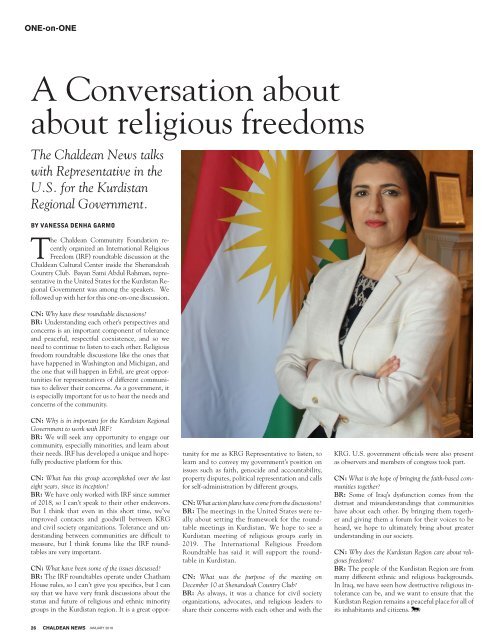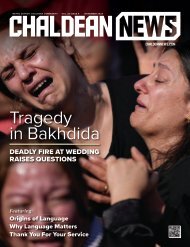JANUARY 2019
Create successful ePaper yourself
Turn your PDF publications into a flip-book with our unique Google optimized e-Paper software.
ONE-on-ONE<br />
A Conversation about<br />
about religious freedoms<br />
The Chaldean News talks<br />
with Representative in the<br />
U.S. for the Kurdistan<br />
Regional Government.<br />
BY VANESSA DENHA GARMO<br />
The Chaldean Community Foundation recently<br />
organized an International Religious<br />
Freedom (IRF) roundtable discussion at the<br />
Chaldean Cultural Center inside the Shenandoah<br />
Country Club. Bayan Sami Abdul Rahman, representative<br />
in the United States for the Kurdistan Regional<br />
Government was among the speakers. We<br />
followed up with her for this one-on-one discussion.<br />
CN: Why have these roundtable discussions?<br />
BR: Understanding each other’s perspectives and<br />
concerns is an important component of tolerance<br />
and peaceful, respectful coexistence, and so we<br />
need to continue to listen to each other. Religious<br />
freedom roundtable discussions like the ones that<br />
have happened in Washington and Michigan, and<br />
the one that will happen in Erbil, are great opportunities<br />
for representatives of different communities<br />
to deliver their concerns. As a government, it<br />
is especially important for us to hear the needs and<br />
concerns of the community.<br />
CN: Why is in important for the Kurdistan Regional<br />
Government to work with IRF?<br />
BR: We will seek any opportunity to engage our<br />
community, especially minorities, and learn about<br />
their needs. IRF has developed a unique and hopefully<br />
productive platform for this.<br />
CN: What has this group accomplished over the last<br />
eight years, since its inception?<br />
BR: We have only worked with IRF since summer<br />
of 2018, so I can’t speak to their other endeavors.<br />
But I think that even in this short time, we’ve<br />
improved contacts and goodwill between KRG<br />
and civil society organizations. Tolerance and understanding<br />
between communities are difficult to<br />
measure, but I think forums like the IRF roundtables<br />
are very important.<br />
CN: What have been some of the issues discussed?<br />
BR: The IRF roundtables operate under Chatham<br />
House rules, so I can’t give you specifics, but I can<br />
say that we have very frank discussions about the<br />
status and future of religious and ethnic minority<br />
groups in the Kurdistan region. It is a great opportunity<br />
for me as KRG Representative to listen, to<br />
learn and to convey my government’s position on<br />
issues such as faith, genocide and accountability,<br />
property disputes, political representation and calls<br />
for self-administration by different groups.<br />
CN: What action plans have come from the discussions?<br />
BR: The meetings in the United States were really<br />
about setting the framework for the roundtable<br />
meetings in Kurdistan. We hope to see a<br />
Kurdistan meeting of religious groups early in<br />
<strong>2019</strong>. The International Religious Freedom<br />
Roundtable has said it will support the roundtable<br />
in Kurdistan.<br />
CN: What was the purpose of the meeting on<br />
December 10 at Shenandoah Country Club?<br />
BR: As always, it was a chance for civil society<br />
organizations, advocates, and religious leaders to<br />
share their concerns with each other and with the<br />
KRG. U.S. government officials were also present<br />
as observers and members of congress took part.<br />
CN: What is the hope of bringing the faith-based communities<br />
together?<br />
BR: Some of Iraq’s dysfunction comes from the<br />
distrust and misunderstandings that communities<br />
have about each other. By bringing them together<br />
and giving them a forum for their voices to be<br />
heard, we hope to ultimately bring about greater<br />
understanding in our society.<br />
CN: Why does the Kurdistan Region care about religious<br />
freedoms?<br />
BR: The people of the Kurdistan Region are from<br />
many different ethnic and religious backgrounds.<br />
In Iraq, we have seen how destructive religious intolerance<br />
can be, and we want to ensure that the<br />
Kurdistan Region remains a peaceful place for all of<br />
its inhabitants and citizens.<br />
26 CHALDEAN NEWS <strong>JANUARY</strong> <strong>2019</strong>

















